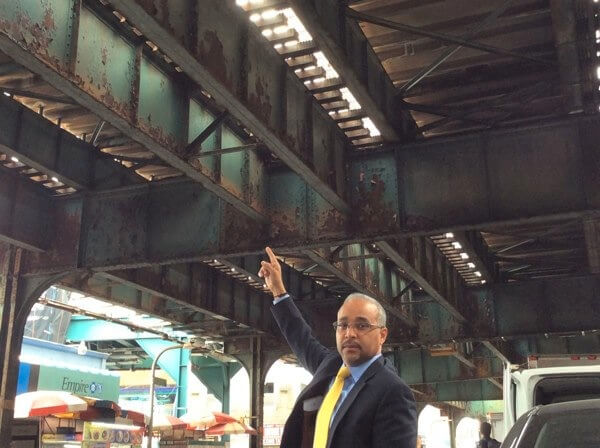By Bill Parry
It took just over a month for the state Senate to unanimously approve legislation that requires the MTA and the NYC Transit Authority to conduct a study about the amount of lead paint in elevated subway tracks, trestles and stations throughout New York City.
The bill was introduced by state Sen. Jose Peralta (D-East Elmhurst) after the District 9 International Union of Painters and Allied Trades pointed out that some samples of paint chips from the elevated No. 7 subway line contained 224,000 parts per million of lead paint, more than 40 times the legal threshold.
“This proposal will help protect everyone from hazardous lead paint chips falling onto the streets,” Peralta said. “We need to remove this dangerous problem from our above-ground subway lines.”
Peralta introduced the legislation May 1, and it passed unanimously Monday. Peralta drew fire from some constituents and several fellow elected officials in January when he left the mainline Democrats and joined the Independent Democratic Conference, an eight-member group that shares power with Republicans in a coalition, allowing them to hold a majority in the Senate.
“When I joined the IDC, I said the main reason for doing it was to better represent my constituents by bringing in more resources, and fighting for legislation,” Peralta said. “When Donald Trump was elected president of our nation, I decided I could no longer wait and sit on the sidelines. I needed to step in and fight for my constituents’ rights. The recent passage of my bill requiring the MTA to conduct a study relative to the amount of lead paint in elevated subway tracks, including the 7 train, is just one example of bringing results to my district, as is the state funding I was able to secure in the budget for numerous local organizations and local schools.”
Meanwhile, Peralta and the IDC released a new report Monday that found nearly 61 percent of consumers surveyed, most of them immigrants, experienced bad reception when using international prepaid calling cards as a cheap alternative to land lines and monthly phone plans. The study also found that 80 percent of people surveyed had dropped calls while using the prepaid calling card and 72 percent used a prepaid calling card that had fewer minutes available than advertised.
Additionally, buyers have little options to file complaints, which makes it difficult for enforcement agencies to tackle the practices of bad actors.
“My constituents are being ripped off when using prepaid calling cards to get in touch with their loved ones back home, with very poor quality communication and calls cutting out,” Peralta said. “We must ensure that we end these bad practices, which mainly affect our hardworking immigrant families. We tested some of the most popular prepaid calling card brands, and they are providing consumers with deficient service.”
Peralta introduced an omnibus bill, S.6142, to tackle prepaid calling card issues on the state level, which will require companies to guarantee quality service, expand disclosure requirements and make companies list contact information for government agencies where consumers could seek recourse.
Reach reporter Bill Parry by e-mail at bparr




































